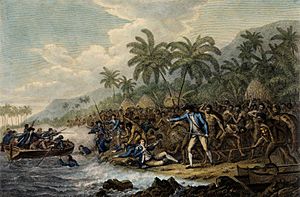Sahlins–Obeyesekere debate facts for kids
The Sahlins–Obeyesekere debate is a big discussion among experts who study different cultures. It's all about what happened when the famous British explorer James Cook died in Hawaii. The main question is: Did the native Hawaiians think Captain Cook was Lono, a special god of their islands? Lono was linked to good harvests, rain, music, and peace. This debate started in 1992 when a scholar named Gananath Obeyesekere wrote a book criticizing the ideas of another scholar, Marshall Sahlins. Beyond just the facts of Cook's death, this debate also shows bigger questions in anthropology, like whether people from Western countries can truly understand cultures that are very different from their own.
Contents
Understanding the Cook-Lono Debate
The Sahlins–Obeyesekere debate is an important discussion in the field of anthropology. Anthropology is the study of human societies and cultures. This particular debate focuses on how different cultures understand each other. It uses the story of Captain Cook's death in Hawaii as a key example.
Who Was Captain James Cook?
James Cook was a famous British explorer, mapmaker, and captain in the Royal Navy. He lived from 1728 to 1779. Cook made three important voyages around the world. He explored and mapped many parts of the Pacific Ocean, including New Zealand, Australia, and the Hawaiian Islands. His journeys helped Europeans learn a lot about the world.
Cook's Voyages to Hawaii
Captain Cook first arrived in the Hawaiian Islands in 1778. He named them the "Sandwich Islands." The native Hawaiians welcomed him. He returned to the islands in 1779. During this second visit, tensions grew between Cook's crew and the Hawaiians.
What Happened to Captain Cook?
Captain Cook died in Hawaii on February 14, 1779. He was killed during a conflict with native Hawaiians at Kealakekua Bay. The exact reasons for the fight are still debated. Some say it was a misunderstanding. Others believe it was due to cultural differences and rising tensions.
The Role of Lono in Hawaiian Culture
In Hawaiian culture, Lono is an important god, or akua. Lono is connected to many good things. These include fertility, farming, rain, music, and peace. There was a special time of year called Makahiki. During Makahiki, people celebrated Lono. They held festivals and stopped fighting.
The Main Question: Was Cook Seen as Lono?
The central part of the Sahlins–Obeyesekere debate is this: Did the Hawaiians believe Captain Cook was the god Lono?
Marshall Sahlins's View
Marshall Sahlins is an American anthropologist. He suggested that the Hawaiians did see Captain Cook as Lono. Sahlins believed that Hawaiian myths and traditions shaped how they understood Cook's arrival. He argued that Cook's arrival during the Makahiki festival made Hawaiians think he was Lono returning. Sahlins thought that Hawaiian culture had a specific "script" for how gods would appear. He believed Cook fit this script.
Gananath Obeyesekere's Challenge
Gananath Obeyesekere is a Sri Lankan anthropologist. He strongly disagreed with Sahlins. Obeyesekere argued that Sahlins's ideas were too "Western." He felt that Sahlins made the Hawaiians seem less intelligent. Obeyesekere believed that Hawaiians were smart and practical. He thought they would not simply mistake a human for a god. He said that Hawaiians would have understood Cook as a powerful chief, not a deity. Obeyesekere argued that Sahlins's view was a form of "Orientalism." This means seeing non-Western cultures as strange or mystical, rather than logical.
Why This Debate Matters
The Sahlins–Obeyesekere debate is more than just about Captain Cook. It's about how anthropologists study other cultures.
Understanding Other Cultures
The debate highlights a big question: Can people from one culture truly understand another? Sahlins believed in finding universal patterns in human behavior. Obeyesekere emphasized the unique ways each culture thinks. This discussion helps us think about how we interpret history and other societies. It reminds us to be careful not to put our own cultural ideas onto others.
The Impact on Anthropology
This debate made anthropologists think harder about their methods. It encouraged them to be more aware of their own biases. It also stressed the importance of listening to the voices of the people being studied. The Sahlins–Obeyesekere debate remains a classic example of how scholars can disagree on important historical and cultural questions.


